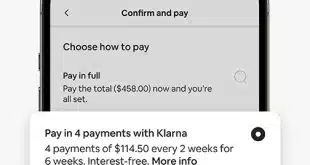PayPal Inc. announced on Thursday it will process payments when owners of electric vehicles charge up their cars at charging stations maintained by GE Industrial Solutions, a unit of General Electric Co.
In what amounts to yet another venture into the physical point of sale for PayPal, the e-commerce processing unit of eBay Inc. says it will be the exclusive payment provider on the WattStation Connect mobile app from GE. The app, which works on the Apple iPhone, lets users find and reserve the closest GE charging point, known as a WattStation, determine charging costs, and check charging progress. They can pay by using the app to scan a quick-response (QR) code shown at the station, which identifies the device and brings up pricing information. GE also plans to issue a contactless card linked to the user’s PayPal account that can be tapped on a reader on the station, according to Scott Dunlap, vice president of emerging opportunities at PayPal. PayPal had almost 110 million user accounts globally as of April, the last month in which it reported numbers.
As for payments exclusivity for PayPal, Dunlap says this will be in effect indefinitely. “Right now there are no plans to incorporate additional payment methods,” he says in an e-mail message.
n
GE, which in April introduced the WattStation network and related WattStation Connect software platform, has shipped about 100 of the sleek charging stations to public and retail locations in the U.S., according to a locator map on company’s Web site, though new ones are being installed by the day. The PayPal payment integration has gone live and works in the U.S. and Canada. Average tickets at the stations will likely vary by vehicle. With electricity typically sold at a rate of 10 cents to 20 cents per kilowatt hour, the cost to charge up a well-known electric car like the Nissan Leaf would be about $2.30, according to EVSroll.com, a Web site devoted to electric cars.
PayPal has been working to penetrate the physical point of sale for some time, relying on mobile technology as well as a specialized plastic card it introduced last fall. It is accepted in nearly 2,000 U.S. Home Depot Inc. stores and projects that about 20 retail chains will have signed on by the end of the year.
The payment processor’s entry into the EV-charging market comes as electric vehicles are starting to gain a small foothold with a U.S. car-buying public weary of paying sky-high gas prices. Technology research firm Gartner projected in January that 100,000 of the cars will be sold in the U.S this year, up from 18,000 in 2011. Cars like the Nissan Leaf and Chevrolet Volt have captured most of the headlines, but a $100,000 luxury car, the Tesla Model S, recently hit the market, as well. Meanwhile, the number of U.S. charging stations, which stood at 750 in April 2011, had climbed to more than 6,000 a year later. The stations tend to be concentrated on the coasts and in Texas and Florida, with more than a quarter of them in California.
Since it takes anywhere from four to eight hours to fully charge an electric car, a typical location for charging stations is in parking lots and garages. Last month, a San Francisco-based payments startup called QuickPay Corp. said it will process transactions for Liberty Plugins Inc., which deploys charging stations at parking facilities. QuickPay’s technology offers parking-lot operators a mobile-payments platform including an access and revenue-control system.






